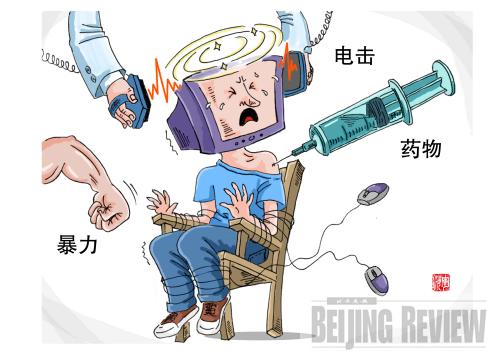|
 |
|
NOWHERE TO HIDE: Rehab camps and clinics that have sprouted up across the country are a last resort for young net addicts' parents. The rehab facilities have been criticized for their therapy methods, such as electroshock and violence (CFP) |
Endlessly surfing the Web may have been shrugged off in the past, but the rising number of teenage Internet addicts, who generally lack effective self-discipline compared to adults, has prompted China to take more serious steps to combat the addiction problem.
Officials, doctors and psychologists are working on a medical definition for the disorder, in addition to establishing standards for treatments, which are expected by year's end, as cases of abuse and even death have emerged from rehab camps and clinics nationwide.
"The Ministry of Health has never ratified any specific clinic to treat such a disorder," said Kong Lingzhi, Deputy Director for Disease Control and Prevention with the Ministry of Health at a press conference on October 10, the World Mental Health Day.
Mainstream opinions hold that Internet addiction could be one symptom of larger mental health issues, such as depression, social phobia and obsessive-compulsive disorder. "Internet addiction does not count as an independent category of psychological disorder and hasn't been diagnosed as such," Kong said.
Psychologists close to these addicts observed that educational failure in one-child families and inefficient communication between parents and children could account for different types of Internet addiction.
Meanwhile, some scholars are debating whether Internet addiction is a legitimate mental-health problem that needs correction and treatment. Some contend that the symptoms, including obsessive Internet use, online gaming and particularly pornography viewing, do interfere with addicts' daily lives, deviating their interest from the real world. Still others suspect that the so-called addiction is simply the prejudice of older generations against the younger "digital natives" who, born in the digital age, are now living much of their lives online.
A big concern
Internet addiction is a growing worldwide phenomenon with no simple solutions. But the problem is exorbitantly worse in China because the country's net population is huge and the Internet addicts are comparatively young.
The latest report compiled by the China Internet Network Information Center on China's Internet development status by June 2009 said 51.8 percent of China's netizens, or 175 million, were younger than 25, a number much higher than that in many developed countries. According to the China Youth Internet Association (CYIA), around 10 percent of China's young Web users may suffer from excessive Internet use.
The 2008 CYIA statistics revealed another feature of China's young net addicts—nearly half of them started using the Internet for online social networking, while more than 40 percent got connected for entertainment purposes such as online gaming.
While drug addiction ranks first and Internet addiction comes fourth in prevalence among teens in the United States, Internet addiction holds the top spot and drug use ranks fourth in China, said Tao Ran, director of the country's first Internet addiction treatment clinic under the supervision of a military hospital.
Some of his patients are video game addicts who wore diapers while playing games. Others camped out at the Internet cafe, playing games for months. One of Tao's social networking addicts even had 68 wedding ceremonies online.
The tendency for young Chinese falling into such addictive patterns may be in part due to over-abundant parental pressures and expectations on their only child, according to Tao.
"Usually spoiled but maintaining high level of self-esteem, these only children feel hurt and then turn to the Internet for consolation when scolded by their parents because they failed to get high grades at school," Tao said.
Furthermore, busy parents and the absence of father figures in modern families could lead to insufficient and inefficient communication between children and parents. This emotional alienation from their parents is another reason for teens to turn to Internet abuse, according to many psychotherapists.
Fathers who are seldom at home or do not play their role very well are to blame for boys' net addiction, said Gao Wenbin, associate researcher with the Institute of Psychology of the Chinese Academy of Sciences at a press conference on October 10. The 2008 CYIA report showed the number of boy addicts was twice that of girl addicts.
"A child, especially a boy, will learn from his father—who is usually his idol during childhood—what self-discipline and self-incentive are," Gao said.
Unhappy and problematic relationship between parents also affects children. "Many parents of teen net addicts don't know the deeper functions of a family, other than offering kids food, clothes and shelter," Tao said. "It's a place for socialization where kids will learn from their parents about how to find a balance between independence and reliance, recognition, confidence and self-esteem, and a place for parents and children to grow together."
Use but not abuse
The problem of Internet abuse among teenagers is not as serious as it could be, according to Kong at the press conference.
"It's inappropriate to describe all net overuse-related problems among teens as Internet addiction," Kong said. "Likewise, it's unwise to conclude that Internet addiction is a problem much worse in China than in other countries only because obsessive use of Internet among teenagers was seen in many headlines."
| 